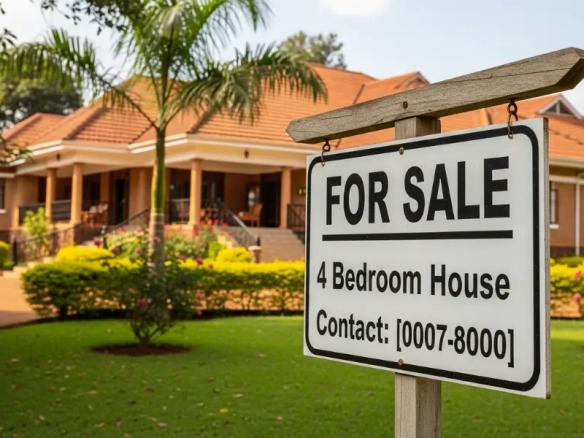Uganda’s real estate market is thriving, offering a variety of houses, and land for sale and rent. Whether you are a first-time buyer, investor, or tenant, navigating the property market requires careful consideration of legal documents, seller verification, and financial planning.
This guide walks you through everything you need to know when buying or renting a property in Uganda, including legal requirements, proof of ownership, and expert tips to help you make a secure transaction.
What to Consider When Buying a Property in Uganda
1. Verify the Seller’s Ownership and Documents
Before purchasing land or a house, confirm that the seller has legal ownership of the property. Request and verify:
- Land Title or Title Deed – Check if the title is in the seller’s name and confirm its authenticity with the Ministry of Lands, or other legal land offices such as Buganda Land Board for Kabaka Land only.
- Sales Agreement – A properly signed sales agreement should outline the purchase terms, payment details, and obligations.
- National ID or Passport of the Seller – Ensure the seller’s identity matches the titleholder.
- Local Leaders and Neighbours – Always Involve and inquire with locals before paying.
- Bibanja holders – these are land tenants with rights but without Land Titles, learn how to buy from them click
💡 Tip: Conduct a land search at the Uganda Land Registry to confirm if the property has any encumbrances, disputes, or pending loans.
2. Legal and Regulatory Requirements
To avoid legal issues, buyers should:
1. ✅ Obtain a Sales Agreement drafted by a lawyer.
2. ✅ Pay stamp duty (1-2%) of the property value to Uganda Revenue Authority (URA).
3. ✅ Transfer ownership legally by registering the property at the Uganda Land Office.
4. ✅ Engage a lawyer or real estate expert to guide you through the legal process.
🔗 Check Uganda’s Land Registration Process Here
3. Know the Different Land Tenure Systems
Uganda has four main land tenure systems, which affect ownership and transfer rights:
- Mailo Land – Owned with a title but may have tenants with rights, commonly known as Kibanja Holders.
- Freehold Land – The owner has full ownership rights, may have tenants with rights.
- Leasehold Land – The government or private entity leases land for a specified period.
- Customary Land – Owned by a community and managed under traditional systems.
💡 Tip: Mailo land and Freehold land are best for permanent ownership, while leasehold land is suitable for temporary investments.
4. Financial Considerations and Mortgage Options
If you’re buying a house in Uganda but need financing, consider mortgage options. Many banks, such as Stanbic Bank, Housing Finance Bank, and DFCU Bank, offer home loans with repayment plans.
Mortgage Requirements in Uganda:
- Proof of income (salary slips or business records).
- Down payment (usually 10-30% of the property price).
- Credit history check.
🔗 Learn More About Mortgage Services in Uganda
What to Consider When Renting a Property in Uganda
1. Inspect the Property Before Renting
Before signing a rental agreement, inspect the property for:
🏠 Condition of the house – Check for leaks, broken fixtures, and general maintenance.
🔌 Utilities and security – Ensure water, electricity, and security measures are in place.
📍 Location & Accessibility – Verify transport routes, proximity to workplaces, and essential services.
2. Understand Rental Agreements and Terms
Your rental contract should outline:
- Monthly rent and payment terms
- Security deposit requirements
- Maintenance responsibilities
- Termination conditions
💡 Tip: Always request a written tenancy agreement to avoid disputes.
3. Confirm the Landlord’s Legitimacy
Scams are common in the rental market. Before making payments:
1. ✅ Ask for proof of property ownership.
2. ✅ Request an official tenancy agreement.
3. ✅ Make payments through traceable methods (bank transfers, receipts).
Common Property Scams in Uganda & How to Avoid Them
1. 🚨 Fake Land Titles: Some sellers forge land titles, so always verify with the Lands Ministry.
2. 🚨 Double Selling: Unscrupulous sellers may sell the same land to multiple buyers. Conduct a land search!
3. 🚨 Unlicensed Agents: Avoid brokers who demand upfront fees without showing properties.
🔗 Report Land Fraud Cases to the Uganda Police
Final Thoughts: Secure Your Property Investment in Uganda
Whether you are buying or renting a property in Uganda, due diligence is crucial. Always verify documents, consult a lawyer, and engage trusted real estate professionals like EstateLad to ensure a smooth process.
Looking to buy, sell, or rent property in Uganda? Browse Verified Listings at EstateLad and let our experts guide you through a seamless transaction.






Join The Discussion